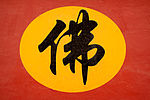Nan Huai-Chin | |||||||||
|---|---|---|---|---|---|---|---|---|---|
南懷瑾 | |||||||||
 Nan Huai-Chin in 1945, after descending Mount Emei from his hermitage. | |||||||||
| Born | March 18, 1918 | ||||||||
| Died | September 29, 2012 (aged 94) | ||||||||
| Alma mater | Republic of China Military Academy | ||||||||
| Occupation(s) | Buddhist monk, religious scholar, writer. | ||||||||
| Spouses |
| ||||||||
| Children | Nan Shunquan Nan Xiaoshun Nan Yipeng Nan Guoxi Nan Shengyin Nan Kemeng | ||||||||
| Parent | Nan Zhengyu | ||||||||
| Relatives | Nan Pinfeng (grandson) | ||||||||
| Chinese name | |||||||||
| Traditional Chinese | 南懷瑾 | ||||||||
| Simplified Chinese | 南怀瑾 | ||||||||
| |||||||||
| Nan Changtai | |||||||||
| Chinese | 南常泰 | ||||||||
| |||||||||
| Part of a series on |
| Chinese Buddhism |
|---|
 |
| Part of a series on |
| Zen Buddhism |
|---|
 |

Nan Huai-Chin (simplified Chinese: 南怀瑾; traditional Chinese: 南懷瑾; pinyin: Nán Huáijǐn) (March 18, 1918 – September 29, 2012) was a Chinese Buddhist monk, religious scholar, and writer. A well-respected spiritual teacher in contemporary China, he was considered by many to be the major force in the revival of Chinese Buddhism.[1] While Nan was regarded by many in China as one of the most influential Chan Buddhist teachers and Vajrayana teachers, particularly in the Cundī practices, he was little known outside the Chinese cultural sphere.[2] Nan died at the age of 94 on Sept. 29th, 2012 in Suzhou, China.[3]
- ^ "Nan Huai Jin". Nan Huai Jin. 2006-09-25. Archived from the original on 2012-10-04. Retrieved 2012-09-30. (Chinese)
- ^ Scharmer, Otto, and Senge, Peter. Presence: Human Purpose and the Field of the Future. 2008. p. 179
- ^ 国学大师南怀瑾在苏州辞世 享年95岁 Archived 2013-01-01 at archive.today